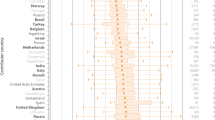Abstract
Background
Laparoscopic sleeve gastrectomy is a relatively new treatment modality implemented in the surgical management for morbid obesity. It has been well documented that obesity is not only associated with an increased risk of malignancies but is also consistent with a higher incidence of surgical complications related to its definitive management. In spite of the weight loss experienced by patients with malignancy due to a catabolic state, bariatric surgery might be considered as a step procedure allowing for a more efficient and suitable surgical approach to treat early stage malignancies, thereby decreasing the procedure-related morbidity and mortality. This study aims to examine the effectiveness of laparoscopic sleeve gastrectomy as a primary weight loss procedure in patients with untreated malignancy facilitating a definitive oncologic surgical approach.
Methods
After institutional review board approval and following Health Insurance Portability and Accountability Act guidelines, we conducted a retrospective review of a prospectively collected database. From September 2006 to March 2009, we analyzed all morbidly obese patients with early stage malignancy that underwent laparoscopic sleeve gastrectomy at the Bariatric and Metabolic Institute as a weight loss surgery prior to a second oncologic procedure. The variables examined were excess body weight, percent excess weight loss, comorbidities, malignancy type, preoperative body mass index (BMI), postoperative BMI, morbidity, and mortality. Mean follow-up time was 3 months until an oncologic procedure was performed.
Results
Our series included four morbidly obese patients. There were three males and one female, with a mean age of 53.75 years (range 27-67 years) and a mean BMI of 48.25 kg/m2 (range 42–55 kg/m2). Mean excess weight in our patient population 176 lbs. Mean weight loss at 3 months after laparoscopic sleeve gastrectomy was 59.35 lbs (range 28–79 lbs). Comorbidities included diabetes mellitus, hypertension, obstructive sleep apnea, chronic obstructive pulmonary disease, Crohn’s disease, coronary artery disease, and previous history of DVT. One patient was diagnosed with a small bowel carcinoid, two patients with renal hypernephroma, and one patient with prostate cancer. After an average time of 3 months, patients underwent a definitive procedure in accordance to their type of malignancy. There were neither postoperative complications nor mortality.
Conclusions
Laparoscopic sleeve gastrectomy is a safe and reasonable approach to effectively reduce weight in order to allow morbidly obese patients with early stage malignancies to undergo a second oncologic procedure.
Similar content being viewed by others
Abbreviations
- BMI:
-
Body mass index
- Fr:
-
French
- LSG:
-
Laparoscopic sleeve gastrectomy
References
Baltazar A, Serra C, Perez N, et al. Laparoscopic sleeve gastrectomy: a multi-purpose bariatric operation. Obes Surg. 2005;15(8):1124–8.
Deitel M, Crosby RD, Gagner M. The first international consensus summit for sleeve gastrectomy, New York City, October 25–27. Obes Surg. 2007;18(5):487–96.
Mognol P, Chosidow D, Marmuse JP. Laparoscopic sleeve gastrectomy: review of a new bariatric procedure and initial results. Surgical Technology International. 2006;15:47–52.
Moy J, Pomp A, Parikh M, et al. Laparoscopic sleeve gastrectomy for morbid obesity. Am J Surg. 2008;196(5):56–9.
Cohen R, Uzzan B, Bihan H, et al. Ghrelin levels and sleeve gastrectomy in super-super-obesity. Obes Surg. 2005;15:1024–9.
Frezza EE, Chiriva-Internal M, Wachtel MS. Analysis of the results of sleeve gastrectomy for morbid obesity and the role of ghrelin. Surgery Today. 2008;38(6):481–3.
Langer FB, Reza Hoda MA, Bohdjalian A, et al. Sleeve gastrectomy and gastric banding: effects on plasma ghrelin levels. Obes Surg. 2005;15(7):1024–9.
Roa PE, Kaidar-Person O, Pinto D, et al. (2006) Laparoscopic sleeve gastrectomy as treatment for morbid obesity: technique and short term outcome. Obes Surg. 2006;16:1323–6.
Lin E, Gletsu N, Fugate K, et al. The effects of gastric surgery on systemic ghrelin levels in the morbidly obese. Arch Surg. 2004;139:780–4.
Tucker O, Szomestein S, Rosenthal R. Indications for sleeve gastrectomy as a primary procedure for weight loss in the morbidly obese. J Gasttrointest Surg. 2008;12:662–7.
Merkow R, Bilimoria K, Mc Carter M, et al. Effect of body mass index on short-term outcomes after colectomy for cancer. J Am Coll Surg. 2009;208:53–61.
Donohoe C, Pidgeon P, Lysaghjt J, et al. Obesity and gastrointestinal cancer. Br J Surg. 2010;97:628–42.
Molokhia EA, Perkins A. Preventing cancer. Prim Care. 2008;35(4):609–2.
Jee SH, Yun JE, Park EJ, et al. Body mass index and cancer risk in Korean men and women. Int J Cancer. 2008;123:1892–6.
Patel AV, Feigelson HS, Talbot JT, et al. The role of body weight in the relationship between physical activity and endometrial cancer: results from a large cohort of US women. Int J Cancer. 2008;123:1877–82.
Jee SH, Kim HJ, Lee J. Obesity, insulin resistance and cancer risk. Yonsei Med J. 2005;46:449–55.
Ruan H, Lodish HF. Regulation of insulin sensitivity by adipose tissue-derived hormones and inflammatory cytokines. Curr Opin Lipidol. 2004;15:297–302.
Christou N, Lieberman M, Sampalis F, et al. Bariatric surgery reduces cancer risk in morbidly obese patients. Surg Obes Relat Dis. 2008;4:691–7.
Boru C, Silecchia G, Pecchia A, et al. Prevalence of cancer in Italian obese patients referred for bariatric surgery. Obes Surg. 2005;15:1171–6.
Tisdale MJ. Catabolic mediators of cancer cachexia. Curr Opin Support Palliat Care. 2008;2(4):256–61.
World Cancer Research Fund. Food, nutrition and the prevention of cancer: a global perspective. Washington: American Institute for Cancer Research; 1997. p. 371–3.
Gendall KA, Raniga S, Kennedy R, et al. The impact of obesity on outcome after major colorectal surgery. Dis Colon Rectum. 2007;50:2223–37.
Sandeep A, Subhash U, Herron D. Laparoscopic sleeve gastrectomy for morbid obesity: a review. Surg Obes Relat Dis. 2007;3:189–94.
Rubin M, Yehoshua RT, Stein M, et al. Laparoscopic sleeve gastrectomy with minimal morbidity early results in 120 morbidly obese patients. Obes Surg. 2008;18(12):1567–70.
Almogy G, Crookes PF, Anthone GJ. Longitudinal gastrectomy as a treatment for the high-risk superobese patient. Obes Surg. 2004;14:492–7.
Cottam D, Qureshi FG, Mattar SG, et al. Laparoscopic sleeve gastrectomy as an initial weight-loss procedure for high-risk patients with morbid obesity. Surg Endosc. 2006;20(6):859–63.
Marceau P, Biron S, Bourque RA, et al. Biliopancreatic diversion with a new type of gastrectomy. Obes Surg. 1993;3:29–35.
Ou Yang O, Loi K, Liew V, et al. Staged laparoscopic sleeve gastrectomy followed by Roux-en-Y gastric bypass for morbidly obese patients: a risk reduction strategy. Obes Surg. 2008;18(12):1575–80.
Hamoui N, Anthone GJ, Kaufman HS, et al. Sleeve gastrectomy in the high-risk patient. Obes Surg. 2006;16(11):1445–9.
Mognol P, Chosidow D, Marmuse J. Laparoscopic sleeve gastrectomy as an initial bariatric operation for high-risk patients: initial results in 10 patients. Obes Surg. 2005;15:1030–3.
Conflict of Interest
All authors have no conflicts to disclose.
Author information
Authors and Affiliations
Corresponding author
Rights and permissions
About this article
Cite this article
Gianos, M., Abdemur, A., Szomstein, S. et al. Laparoscopic Sleeve Gastrectomy as a Step Approach for Morbidly Obese Patients with Early Stage Malignancies Requiring Rapid Weight Loss for a Final Curative Procedure. OBES SURG 23, 1370–1374 (2013). https://doi.org/10.1007/s11695-013-0933-z
Published:
Issue Date:
DOI: https://doi.org/10.1007/s11695-013-0933-z




